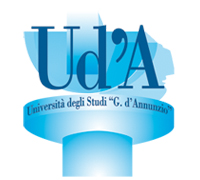Nutrigenomic
Schema della sezione
-

The main objectives of the course can be summarized as follows:
1) To provide information about the genetic basis of human diseases, with specific regards to multifactorial conditions and susceptibility to diseases in which lifestyle and diet play a key role as environmental factors;
2) To illustrate the genetic basis of a number of diseases characterized by male or female infertility
3) To provide information about the genetics and epigenetics mechanism leading to infertiltiy or to alterations in the program of embryo development in turn leading to an increased susceptibility to adult onset diseases as diabetes, gestational diabetes, obesity and others. In this last topic, the most recent hypothesis about the developmental origin of adult human diseases will be illustrated.

Click here to download CLASS SCHEDULE

LIBORIO STUPPIA
Director of the Department of Psychological, Health and Territorial Sciences
G. D’Annunzio University of Chieti-Pescara
EDUCATION
1987: Degree in Medicine and Surgery summa cum laude, Chieti University Medical School
1990: Specialization in Haematology summa cum laude, Chieti University Medical School
1990: Working visitor, Human Genetics Unit, Medical Research Council, Edinburgh, UK
1996-2001: Researcher, Medical Genetics, G. D’Annunzio University, Chieti-Pescara
2001-2007: Associate Professor, Medical Genetics, G. D’Annunzio University, Chieti-Pescara
from 2002: Head of the laboratory of Functional Genomics, Center of Studies of Aging (CESI) of the "G. D'Annunzio" University.
from 2007: Full Professor, Medical Genetics, G. D’Annunzio University, Chieti-Pescara
2010-2012: Dean of the Faculty of Psychology, G. D'Annunzio University, Chieti-Pescara
2011-2015: Member of the Italian National Committee for Biosecurity, Biotechniques and Life Sciences.
RESEARCH ACTIVITY
Prof. Stuppia has mainly worked in the field of Molecular Genetics, with particular attention to the study of the genetic basis of the infertility of the couples and of the genes involved in the failure of spermatogenesis. Studies of Liborio Stuppia have evidenced the presence of microdeletions of the Y chromosome long arm in infertile males. Other studies carried out by Liborio Stuppia have provided useful data about the prevalence of these deletions in infertile males, and about the molecular characterization of some of the genes involved in these rearrangements. Subsequently, the activity of Liborio Stuppia has been mainly devoted to the study of expression profiles in normal and pathological human tissues, particularly of the transcriptome of testis of normal and infertile patients. More recently, he moved his attention on the study of epigenetic mechanisms involved in male infertility and in transgenerational effect of male exposure to environmental agents. The most recent filed of interest of Liborio Stuppia is represented by Amniotic Fluid Stem Cells. In this field, Liborio Stuppia has published several reports describing the specific feature of this cellular model and their usefulness in regenerative medicine.
PUBLICATIONS
Professor Liborio Stuppia has published more than 190 scientific articles on international scientific journals with impact factor.

MARINA LA ROVERE
EDUCATION
10/2008–07/2012 Bachelor degree in Biotechnology University of Teramo 110/110 cum laude
01/2013–12/2013 Laboratory technician - Scholarship at the Stem Cells Research Laboratory of UOC Transfusion Center – Civilian Hospital in Pescara
01/2014–08/2015 Biotechnologist Laboratory of Molecular Genetics – University of "G. d'Annunzio" of Chieti (Italy) - Scholarship for the research project: "Isolation, characterization and reprogramming of human stem cells from amniotic fluid for the design of in vitro models of genetic diseases".
01/2014–10/2015 Master's Degree in Reproductive Biotechnology University of Teramo 110/110 cum laude
12/2014–Present Biology professor Italian Academy of Traditional Osteopathy (AIOT) - Pescara (PE)
11/2015–Present PhD in Neuroscience and Imaging University "G.d'Annunzio" of Chieti Laboratory of Molecular Genetics
PUBLICATIONS
Co-Author of article: "Thyroid hormones increase collagen I and cartilage oligomeric matrix protein (COMP) expression in vitro human tenocytes". In: Muscles Ligaments Tendons Journal 2014 Nov 17;4(3):285-91. eCollection 2014 Jul.
POSTERS
Correlation between nutrigenetic variants, adherence to the Mediterranean diet and obesity in male infertility - XIX SIGU conference, Torino 23-26/11/2016;
Generation of male-like germ cells in vitro from human Amniotic Fluid Stem Cells - SCR Italy conference, Salerno 28-30/05/2014.Lab 1
Practical lessons:
Student will have the opportunity to attend the lab of Molecular Genetics and to get experience in the most used techniques for the diagnosis of genetic diseases (PCR amplification, Sanger sequencing, Next Generation Sequencing), with specific regards to those causing infertility. Moreover, they will have the opportunity to verify some novel techniques for the study of epigenetic modification of human DNA, namely DNA methylation of the promoter of specific genes. During their experience, students will also have the opportunity to observe and interpretate the results of these analysis.
-
•Part 1:–Medical Genetics in the 21 century•Part 2:–Medical Genetics and infertility•Part 3:
- Genetic, epigenetics, food and reproduction